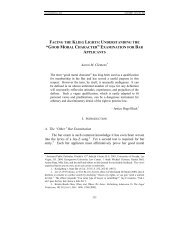The Science and Statistics Behind Spanking Suggests that
The Science and Statistics Behind Spanking Suggests that
The Science and Statistics Behind Spanking Suggests that
You also want an ePaper? Increase the reach of your titles
YUMPU automatically turns print PDFs into web optimized ePapers that Google loves.
11-FULLER_FINAL_AFTERPROOF.DOC 2/17/2009 8:50 AM<br />
2009] THE SCIENCE AND STATISTICS BEHIND SPANKING 293<br />
pediatrics professors <strong>that</strong> organized the conference admitted <strong>that</strong>, before<br />
the conference, they “had a preconceived notion <strong>that</strong> corporal<br />
punishment, including spanking, was innately <strong>and</strong> always ‘bad.’” 264 By<br />
the end of the conference, they both realized <strong>that</strong>, “given a relatively<br />
‘healthy’ family life in a supportive environment, spanking in <strong>and</strong> of<br />
itself is not detrimental to a child or predictive of later problems.” 265<br />
This is common. Many people have a preconceived notion <strong>that</strong><br />
physical discipline is harmful because most literature <strong>that</strong> opposes<br />
spanking is not only methodologically flawed, but also emotionally<br />
charged. 266 This can be dangerous because playing on emotions makes<br />
it easier to influence people, especially when the subject is as moving as<br />
our children. 267<br />
For instance, Dr. Straus tirelessly manipulates his readers just by<br />
using the word “hitting” instead of “spanking.” 268 He never uses this<br />
tactic when his research links harmful effects to grounding, privilege<br />
removal, or allowance removal. 269 Dr. Straus never refers to grounding<br />
as “imprisonment” or withholding allowance as “robbing.” Indeed, he<br />
doesn’t seem to mention at all <strong>that</strong> his research indicates such<br />
punishments are more harmful than spanking. 270<br />
264. See, e.g., Rosellini, supra note 27 (“When Larzelere <strong>and</strong> others presented their research at<br />
the 1996 AAP conference on spanking, it prompted a quiet wave of revisionism. <strong>The</strong> two<br />
conference organizers, S. Kenneth Schonberg <strong>and</strong> Stanford B. Friedman, both pediatrics professors<br />
at Albert Einstein College of Medicine in New York, wrote afterward in Pediatrics, ‘We must<br />
confess <strong>that</strong> we had a preconceived notion <strong>that</strong> corporal punishment, including spanking, was<br />
innately <strong>and</strong> always “bad.”’”).<br />
265. Id. (“[B]y the end of the conference, the two skeptics acknowledged <strong>that</strong> ‘given a<br />
relatively “healthy” family life in a supportive environment, spanking in <strong>and</strong> of itself is not<br />
detrimental to a child or predictive of later problems.’”).<br />
266. Compare, e.g., Trumbull, supra note 180 <strong>and</strong> accompanying text; Trumbull, supra note<br />
123; Edwards, supra note 20 <strong>and</strong> accompanying text, with STRAUS, supra note 33 (calling spanking<br />
“hitting” throughout the book), <strong>and</strong> supra note 102 <strong>and</strong> accompanying text.<br />
267. Compare, e.g., FRANCIS GRAHAM WILSON, POLITICAL PHILOSOPHY AND CULTURAL<br />
RENEWAL: COLLECTED ESSAYS 14-15 (H. Lee Cheek, Jr., M. Susan Power & Kathy B. Cheek eds.,<br />
2001) (citing FRANCIS GRAHAM WILSON, A THEORY OF PUBLIC OPINION 101, 103 (Greenwood<br />
1975) (1962)) (“[P]ublic discourse [is] endangered by propag<strong>and</strong>a <strong>and</strong> submerged within an<br />
increasingly urban culture. <strong>The</strong> propag<strong>and</strong>ist uses sophisticated techniques to create symbols, <strong>and</strong><br />
does not appeal to reason; rather he uses emotion in order to manipulate mass minds in the<br />
contemporary world. In a modern secular democracy where intellectuals manipulate public opinion,<br />
discourse in the public square is vastly different from a communal, consensual discussion.”), with,<br />
e.g., Eisenstadt v. Baird, 405 U.S. 438, 453 (1972) (saying children can fundamentally affect a<br />
person).<br />
268. See generally STRAUS, supra note 33 (calling spanking “hitting” throughout the book).<br />
269. See, e.g., supra note 238 <strong>and</strong> accompanying text.<br />
270. See, e.g., id.

















